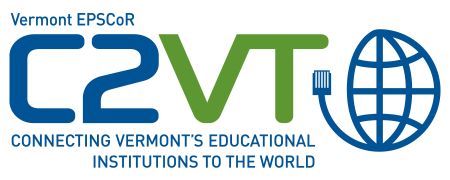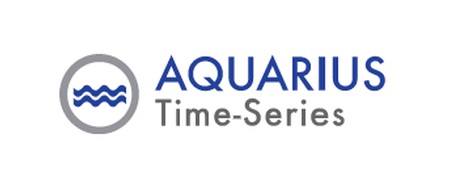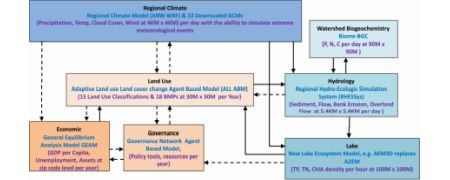
 Compute / Storage
Compute / Storage Purchased in 2013, babbage is a 32-core Dell Poweredge R820 with 256GB of system memory. Babbage serves as our portal into our EPSCoR cyberinfrastructure, running NoMachine to provide a desktop interface to ease users' transitions to a cloud computing environment. Babbage also runs our RStudio Server website and serves as our Globus endpoint.
Installed in October of 2016, pascal is a NVIDIA DGX-1. Pascal has 40 CPU cores, 8 NVIDIA Telsa P100 GPUs which provide 28,672 CUDA cores and 128GB of GPU memory, and 512GB of system memory. Researchers use customized NVIDIA GPU-Accelerated Containers (NGCs) on pascal to build artificially intelligent models in frameworks such as Tensorflow and FLAME.
Vermont EPSCoR partners with UVM Enterprise Technology Services (ETS) to provide 100TB of network storage space for our research data. Epscorfs is available as a windows network drive and to babbage and pascal for long term storage of modeling results and other research data.
 Networking
NetworkingIn 2012, the North East Cyberinfrastructure Consortium (NECC), a partnership between NSF EPSCoR and NIH IDeA programs in Maine, New Hampshire, Vermont, Rhode Island and Delaware, completed their work in building a fiber network to connect higher education institutions in the North East to Internet2, greatly improving connectivity in the region.
Building off of the work of the NECC, Vermont EPSCoR assembled Vermont UCAN, a statewide research and education network to provide Internet2 connectivity to community anchor institutions (CAIs) such as K-12 schools, libraries, higher education, and the state government. Over 125 locations in VT are currently connected to Vermont UCAN.
The hub for Vermont EPSCoR research, the EPSCoR Interdisciplinary Research Space at 23 Mansfield, is connected to the UVM campus network and data center at 10Gbps via a Cisco 3750x purchased by Vermont EPSCoR and installed, managed and maintained by UVM Network Services.
Marsh Life Sciences, which houses Vermont EPSCoR staff as well as staff and labs for the NIH IDeA program, is also connected to the UVM campus network at 10Gbps via a Cisco 3750x.
 Access to National Cyberinfrastructure
Access to National CyberinfrastructureVermont EPSCoR has secured three allocations on the NCAR high-performance computing (HPC) resource (currently Cheyenne, previously Yellowstone) for EPSCoR researchers in 2014, 2016, and 2019. These allocations allow Vermont EPSCoR to run dozens of scenarios through our Integrated Assessment Model (see Research below) in parallel as well as calibrate and explore the sensitivity of our research models.
 Services
ServicesNoMachine provides a graphical desktop and access to graphical applications running on our compute resources to ease the learning curve for our researchers with less familiarity with the Linux command line.
Vermont EPSCoR provides a RStudio web interface which allows researchers access to babbage's compute resources for data science in R.
Aquarius is our hydrology database which manages the data collected from our lake, stream, and soil sensor networks. Aquarius has a API to import data into the data analysis tool of choice and a web interface to browse and QA/QC the data. LoggerNet runs on a virtual machine and is responsible for pulling the data from the sensors in the field to UVM for import into Aquarius.
Vermont EPSCoR maintains a Globus endpoint so researchers can transfer data between our cyberinfrastructure and other compute sites, such as NCAR and our collaborators at Dartmouth College.
Both of our compute resources support singularity containers which give our researchers the ability to transfer and reproduce their results on other compute platforms.
Our software developer and cyberinfrastructure manager (see Staff below) work with Vermont EPSCoR researchers to help them access, use, and learn about our computing resources. Most facilitation is on a one-to-one basis, but training sessions are occasionally organized for topics of broad interest and to introduce new researchers to our cyberinfrastructure resources.
 Research
ResearchThe Vermont EPSCoR IAM, built upon the Pegasus Workflow Management System and HTCondor, allows researchers to simulate dozens of policy scenarios in parallel using both local and national compute resources.

Steve Exler is Vermont EPSCoR's IT Professional. Steve maintains and updates the website and provides computing support for Vermont EPSCoR researchers and staff.

Scott Turnbull is Vermont EPSCoR's Software Developer. Scott serves as an advanced computing facilitator and works on software development tasks for the IAM.

Patrick Clemins is Vermont EPSCoR's Manager of Cyberinfrastructure and Partnerships. Pat provides strategic direction for cyberinfrastructure investments and projects, serves as a facilitator, and is also a software developer for the IAM and other research efforts.